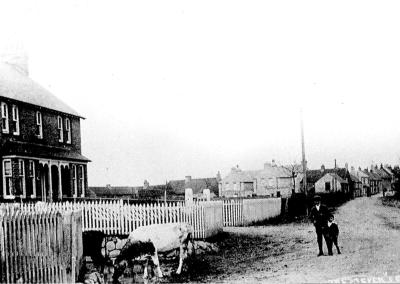Hutton Rudby
Hutton Rudby was once known as Hutton-juxta-Rudby, or Hutton-nigh-Rudby, because it is
really two villages: Hutton and Rudby, separated from each other by the River Leven.
How old is the village?
There have been people living here for thousands of years. Stone Age tools have been found in
North End. The people of the Bronze Age buried their dead on Folly Hill in a 'round barrow',
excavated in 1889 by Canon Atkinson, the famous vicar of Danby. Bronze Age arrowheads have
been found and the quernstones with which people ground their corn. There were Iron Age
villages near Sexhow and Hundale.
From the 1st century AD the Romans invaded and colonised Britain, and they lived here too.
There are the remains of a hypocaust (the heating system for a house) by the river between Hutton Rudby and Stokesley.
Next to come were the Anglo-Saxons, warriors who came across the North Sea to Britain from the 5th century. In areas under their control most villages took
Anglo-Saxon names – this village became "Hutton". After a time Christianity, which had come to Britain in Roman times, grew strong again and a church was
built in Hutton, but we do not know where.
From the end of the 8th century the Vikings began raiding the coast and at last took control of the north-east of England. Hutton now lay in the Viking Kingdom
of York, and the villages of Rudby, Skutterskelfe and Sexhow have Viking names.
When William the Conqueror invaded England in 1066 he divided the land amongst the men who followed him from Normandy. But in the North fighting
against William continued and in 1069 William ordered his soldiers to lay waste the land, murdering the people, burning their homes and crops and killing their
animals. There was nothing left to feed the people who survived, and they sold themselves into slavery or fled south to find food. The following year it was
written that there was still "no village inhabited between York and Durham; they became lurking places to wild beasts and robbers and were a great dread to
travellers." As a result of this, the Domesday Book in 1086 shows Hutton and Rudby to be "waste" - hardly inhabited or farmed.
The new Norman lords, the Meynills, built a church by the river, and each of the mediaeval townships, Hutton, Rudby, Skutterskelfe and Sexhow, had its own
manor house. Hutton began to take the shape we know today with houses gathered around a village green, which was probably where animals were kept safe
at night.
What do the place names mean?
Hutton (the -ton ending shows this is an Anglo-Saxon name) means "village on a hill".
Rudby (the -by ending shows this is a Viking name) means either "Rudi's village" (a man's name)
or "Rudda's village" (a woman's name).
Sexhow means either "Sekk's hill" or "the six hills".
Skutterskelfe means "village on the bank of a stream".
Leven is a Celtic word, from the people who lived here before the Romans. It probably means
"smooth".
How did the people make their living?
For hundreds of years the villagers worked in farming or at the trades which were essential for village life - as blacksmiths, millers, carpenters etc. By the 18th
century Cleveland was becoming famous for its wheat, butter, cheese, cattle and horses. The villagers of Hutton Rudby had always made cloth for their own use,
but from about 1700 many worked in their own homes spinning and weaving flax into linen to sell. Some flax was grown locally, but most came from the Baltic
into the ports of Yarm and Stockton.
Spinning was done by the warmth of the fire with the help of light from a little window near the fireplace, while weavers worked generally in a shed near their
house. The cloth they made was taken by mules to markets all over the North East.
This linen industry became more and more important, until by 1831 the village had more weavers for its size than any other village in the North Riding of
Yorkshire.
The coming and going of the weavers themselves, the bales of flax and the webs of finished cloth, made the village an active and outward-looking place. In the
heyday of smuggling between 1750 and 1830, when vast amounts of tea, coffee, gin, tobacco, wines and soap were being brought ashore by the smuggling
gangs on the Cleveland coast, people in Hutton Rudby were engaged in the secret trade of getting the smuggled goods into the towns and villages of the
countryside. In those days, people of neighbouring townships claimed that the village was so notorious for its smugglers and thieves that no one would give
Hutton Rudby women work as servants, and they were fond of quoting the rhyme:
Hutton Rudby and Enterpen
Far more rogues than honest men









